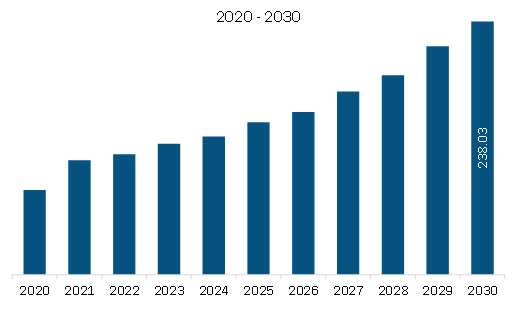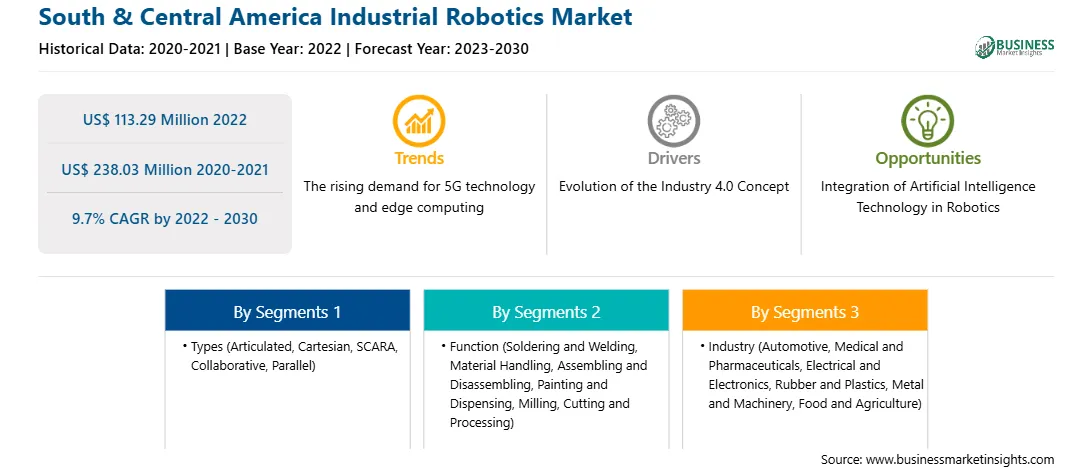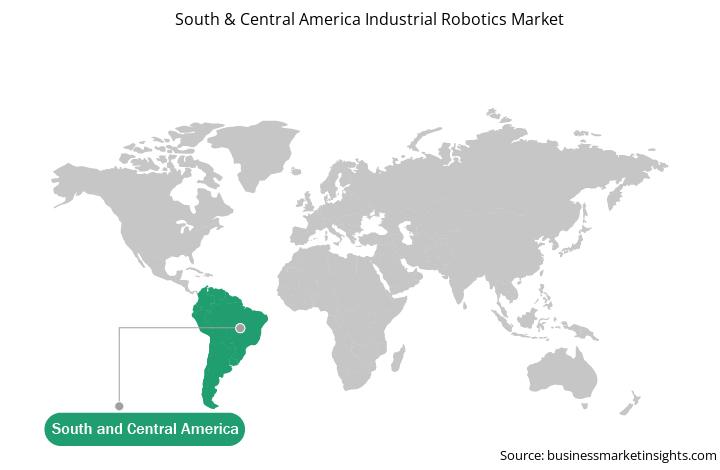Sustainability and environmental considerations are anticipated to be vital trends in the South & Central America industrial robotics market. Industrial robots are being designed to be more energy efficient with improved power management systems and energy-saving features. In coming years, the robotics sector will focus on developing energy-efficient robots that would help companies lower their carbon footprint and achieve sustainability goals. Industrial robots can also improve material efficiency, optimize processes, and reduce waste. Additionally, advancements in recycling robot components and materials can reduce the industry's environmental impact. Industrial robotics are expected to involve green manufacturing practices to reduce the use of hazardous substances and minimize emissions. Manufacturers would be able to explore the usage of eco-friendly materials and sustainable design principles by introducing industrial robots. This will include selecting materials with lower environmental impact. By embracing sustainability and environmental considerations, the South & Central America industrial robotics market can contribute to a more sustainable manufacturing sector. These above-mentioned future trends will drive the development of more environment friendly robotics systems aligning with global efforts toward a greener and more sustainable future.
The South & Central America industrial robotics market is segmented into Brazil, Argentina, and the Rest of South & Central America. The region held the smallest share of the market in the global analysis. In the past few years, South & Central America has witnessed business potential for warehouse and manufacturing automation. For instance, in 2021, ABB Ltd announced its plan to develop SafeMove collaborative robot technology at the manufacturing facility of Nestle SA, Brazil. The company, in collaboration with Nestle SA’s engineering team, developed an ABB IRB 660 robot with SafeMove technology, aimed at improving productivity by 53%. According to the statistical yearbook released by the International Federation of Robotics 2022, robot installations in Brazil were registered at 1,702 units in 2021, with an average annual growth rate of 7% compared to 2016. Further, end-use industries prefer suitable lubrication systems to decrease the wear and tear of robotic components and reduce downtime. Thus, the key factors such as growth in automobile and manufacturing sector are propelling the demand for industrial robots in South & Central America are anticipated which is expected to boost the South & Central America industrial robotics market during the forecast period. Moreover, various industrial robot manufacturers are launching new products in South & Central America. For instance, in 2021, Mitsubishi introduced the Assista collaboration robot to the region. Assista is built with ease of deployment for original equipment makers and end users, as its high-quality internal wiring and plumbing decrease the chance of cables becoming hooked or snagged, enhancing uptime and reducing the need for repairs. The South & Central America industrial robotics market in the region is expected to grow owing to factors such as the increasing adoption of robotics for the automotive and food & beverages industries. For instance, Nestle's confectionery plants benefit from ABB's SafeMove collaborative robot technology, which improves employee safety while enhancing efficiency. Nestlé, the world's largest food and beverage corporation, is deploying an ABB palletizing robot system to increase pallet loading productivity in its chocolate manufacturing plants in Brazil by 53%.
Strategic insights for the South & Central America Industrial Robotics provides data-driven analysis of the industry landscape, including current trends, key players, and regional nuances. These insights offer actionable recommendations, enabling readers to differentiate themselves from competitors by identifying untapped segments or developing unique value propositions. Leveraging data analytics, these insights help industry players anticipate the market shifts, whether investors, manufacturers, or other stakeholders. A future-oriented perspective is essential, helping stakeholders anticipate market shifts and position themselves for long-term success in this dynamic region. Ultimately, effective strategic insights empower readers to make informed decisions that drive profitability and achieve their business objectives within the market. The geographic scope of the South & Central America Industrial Robotics refers to the specific areas in which a business operates and competes. Understanding local distinctions, such as diverse consumer preferences (e.g., demand for specific plug types or battery backup durations), varying economic conditions, and regulatory environments, is crucial for tailoring strategies to specific markets. Businesses can expand their reach by identifying underserved areas or adapting their offerings to meet local demands. A clear market focus allows for more effective resource allocation, targeted marketing campaigns, and better positioning against local competitors, ultimately driving growth in those targeted areas.
South & Central America Industrial Robotics Strategic Insights

South & Central America Industrial Robotics Report Scope
Report Attribute
Details
Market size in 2022
US$ 113.29 Million
Market Size by 2030
US$ 238.03 Million
Global CAGR (2022 - 2030)
9.7%
Historical Data
2020-2021
Forecast period
2023-2030
Segments Covered
By Types
By Function
By Industry
Regions and Countries Covered
South and Central America
Market leaders and key company profiles
South & Central America Industrial Robotics Regional Insights

The South & Central America industrial robotics market is segmented into types, function, industry, and country.
Based on types, the South & Central America industrial robotics market is segmented into articulated, cartesian, SCARA, collaborative, parallel, and others. In 2022, the articulated segment registered the largest share in the South & Central America industrial robotics market.
Based on function, the South & Central America industrial robotics market is segmented into soldering and welding, material handling, assembling and disassembling, painting and dispensing, milling, and cutting and processing. In 2022, the soldering and welding segment registered the largest share in the South & Central America industrial robotics market.
Based on industry, the South & Central America industrial robotics market is segmented into automotive, medical and pharmaceuticals, electrical and electronics, rubber and plastics, metal and machinery, and food and agriculture. In 2022, the automotive segment registered the largest share in the South & Central America industrial robotics market.
Based on country, the South & Central America industrial robotics market is segmented into Brazil, Argentina, and the Rest of South & Central America. In 2022, Brazil registered the largest share in the South & Central America industrial robotics market.
ABB Ltd, Comau SpA, Fanuc Corp, Kawasaki Heavy Industries Ltd, Kuka AG, Mitsubishi Electric Corp, Seiko Epson Corp, Staubli International AG, Universal Robots AS, and Yaskawa Electric Corp are the leading companies operating in the South & Central America industrial robotics market.
The South & Central America Industrial Robotics Market is valued at US$ 113.29 Million in 2022, it is projected to reach US$ 238.03 Million by 2030.
As per our report South & Central America Industrial Robotics Market, the market size is valued at US$ 113.29 Million in 2022, projecting it to reach US$ 238.03 Million by 2030. This translates to a CAGR of approximately 9.7% during the forecast period.
The South & Central America Industrial Robotics Market report typically cover these key segments-
The historic period, base year, and forecast period can vary slightly depending on the specific market research report. However, for the South & Central America Industrial Robotics Market report:
The South & Central America Industrial Robotics Market is populated by several key players, each contributing to its growth and innovation. Some of the major players include:
The South & Central America Industrial Robotics Market report is valuable for diverse stakeholders, including:
Essentially, anyone involved in or considering involvement in the South & Central America Industrial Robotics Market value chain can benefit from the information contained in a comprehensive market report.